Acting : Reviews
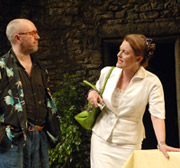
Nova Scotia 2008

-
A WORD WITH DR JOHNSON, James Runcie, directed by Marilyn Imrie, Oran Mor and Traverse, 2015.
"..his wife, Tetty, played by Gerda Stevenson with such grace and poignancy that it’s hard to believe that within a couple of minutes, she’s once again back in breeches and tam o’shanter, playing Dr Johnson’s favourite Scotch assistant, Mr Sheils." The Scotsman.
"With Gerda Stevenson at her articulate, delicately-observed best as Tetty – and robustly vibrant in a variety of trouser roles – there is a touching sense of the uxorious to their relationship. There is nothing needy about her Tetty, though, as she articulates the understanding relationship of a woman of formidable intellect with a man over a decade her junior." www.alledinburghtheatre.com
"Gerda Stevenson’s beautiful clear voice caresses both prose and song as she easily switches gender from the cocky Mr Shiels to the ailing, cordial drinking Mrs Johnson." www.edinburghguide.com
-
GRIT - THE MARTYN BENNETT STORY, by Kieran Hurley, directed by Cora Bissett, Tramway and Mull Theatre, 2014.
"As Martyn’s mother, folklorist and singer Margaret Bennett, Gerda Stevenson’s fine singing voice and grasp of Gaelic was a godsend, as she was for this role. As the mother introducing her son to the worlds of Scottish literature and music or nervously recording song under Martyn’s dictatorial direction Stevenson was the perfect, gentle, nurturer of Grierson’s wide-eyed, inquisitive, perfectionist Martyn. In playing a number of other female roles Gerda Stevenson showed immense versatility, not least with her joyous portrayal of traveller/singer/writer Sheila Stewart, whose guidance was a strong influence on Martyn’s last album." www.folkradio.co.uk
"...supported beautifully by Gerda Stevenson, in fine voice in Gaelic song as Bennett’s mother, Margaret (among other roles).: The Telegraph.
-
THE GOVERNMENT INSPECTOR, by Nicolai Gogol, Communicado Theatre Co., 2010/11
"...his invincibly vain and silly wife Anna, superbly played by Gerda Stevenson." Joyce McMillan, The Scotsman, 2011.
-
Tam O' Shanter , Communicado, Assembly, Edinburgh Fringe, 2012
"...knockout performance from Gerda Stevenson." Michael Coveney, What's on Stage.
"...many splendid solos, the most memorable by Gerda Stevenson." The Skinny.
"...with Gerda Stevenson giving particularly fine voice to Jon Beales’ arrangements of the Bard’s ballads and sangs." The List.
-
The Lasses, O. by Janet Paisley, directed by John Bett, 2009..
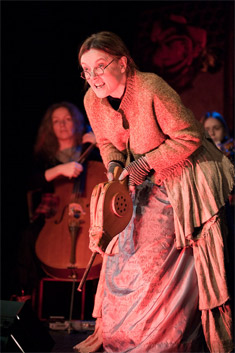
"...so passionately inventive and well-made, that on Saturday night in Melrose, some of the audience were moved to a standing ovation...a new perspective on Burns...a passionate and beautifully pitched performance from Gerda Stevenson. John Bett's production, is one of the most subtly feminist shows I've seen in a while; one in which the desire, creativity, nurturing energy and tradition-bearing power of women take a memorable leading role, even as they celebrate the life and song of a rare man who, instead of fearing the sensual power of women, matched it with his own, allowing it to soar free."
Joyce McMillan, The Scotsman.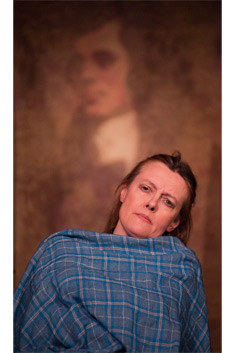
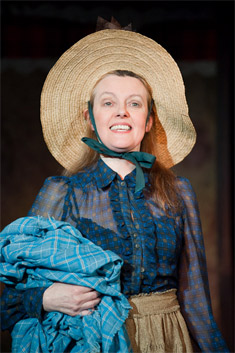
Photography and Lighting Design by Andrew Wilson www.gobolight.co.uk
"The Lasses, O - skilfully written, subtly directed by John Bett for the Rowan Tree company, performed with terrific commitment and no little virtuosity by Gerda Stevenson, and accompanied by three young (and female, naturally) musicians, is about as neat a small-scale show about Burns as you could ask for - original, amusing...thoughtful and celebratory." The Times..
"Oh, the Lasses were a hit! Gerda Stevenson played all four women in a magisterial performance – her Scots perfect, her evocation of Janet Paisley's characters precise and immediate.
The musicians, Seylan Baxter, Lillias Kinsman-Blake and Rachel Newton, were themselves an integral part of the stories, their exciting music and singing like a Greek chorus. The audience was spellbound." The Southern Reporter.
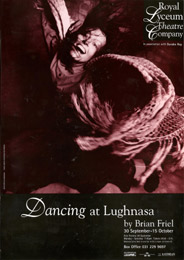
Dancing at Lughnasa 1996
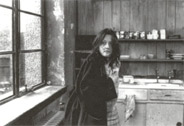
Blue Black Permanent 1992
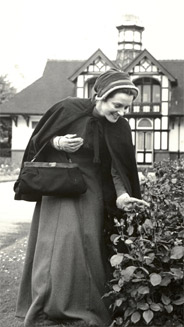
early days at Stoke
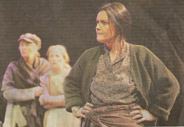
Yellow on the Broom

Macbeth on Inchcolm
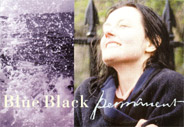
Blue Black Permanent 1992
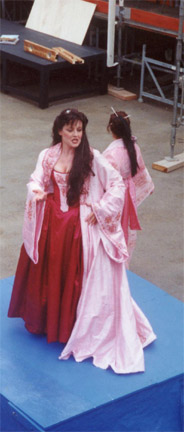
the Thrie Estaites
-
NOVA SCOTIA, by John Byrne, Traverse, Spring, 2008.
“Gerda Stevenson provides a particularly sharp performance as Lucille.”Thom Dibdin,The Stage, 1st May, 2008.
“Morrow's resentful Phil, Mulgrew's comically self-obsessed Spanky and Stevenson's long-suffering Lucille, all from the original Slab Boys line-up, sparkle.”Lynne Walker, The Independent, 2nd May, 2008.
“Excellently portrayed by Morrow, Mulgrew and Stevenson, they refuse to behave as if the world has passed them by -- still lusty, witty and ambitious.” Mark Fisher, Variety, 6th May, 2008.
“There’s the odd laugh here and there – most of them courtesy of Gerda Stevenson’s deadpan Lucille .” Shona Craven, Onstage Scotland, May 2008.
“Stevenson captures a host of raunchy undertones that are deftly balanced in equal measure to the maternal ‘Weegie wifey’ as she runs around after Spanky as if he were a two year old.” Mhairi MacLeod, itsonitsgonecom, 30th April, 2008.
-
FROZEN, by Bryony Lavery, Rapture Theatre, Autumn, 2006.
“Magnificently played by Gerda Stevenson, Nancy is a woman wholly exposed to the audience from the start. Stevenson as the mother and John Kazek as the killer both give disturbingly brave and powerful performances, and the impact is both overwhelming, and, in the end, strangely life-enhancing.” Joyce McMillan, The Scotsman, November, 2006.“It’s Gerda Stevenson’s Nancy who grabs the emotional reins. Ageing beautifully through several costumes and 20 years, she’s ordinary and decent. But the ordinary becomes extraordinary when shaped by intense pressure. Conversationally informal or blazing with the force of a tragic protagonist, Stevenson is the heart of this intricate, yet clear, drama...a not-to-be-missed tour.” ReviewsGate, October, 2006.
“...the audience hardly dares draw breath. Kazek is horrifyingly believable as the amoral Ralph. Stevenson creates an emotionally charged account of all the different phases which Nancy goes through after the disappearance of her daughter. All told, a stunning production.”
The Stage, October, 2006.Gerda Stevenson as Nancy captures the horrific contradictions in knowing the worst but also attempting, on the surface, to live a normal life. Trapped with her pain, she desperately wants to "feel better or even different."... it's the performances which remain in the memory: the three damaged people are perfectly portrayed. Stevenson in particular goes through the wringer, but emerges with some semblance of hope. "Actually," she says, "nothing is unbearable"..” Stephen Gray, Edinburgh Evening News, 6th November, 2006.
- PHAEDRA (title role, opposite David Rintoul as Theseus), translated by Edwin Morgan, directed by Kenny Ireland, Royal Lyceum, 2000:
“Gerda Stevenson gives an electric performance as Phaedra, a dark, passionate, tormented figure, doomed by the Gods to love her stepson.” Hugh Rorrison, Plays International, June 2000.“Gerda Stevenson is nothing short of superb, soaring, grovelling, girlish, and haggard, terrifying and deeply moving in the grip of her terrible fate.” Joyce McMillan, The Scotsman, April 2000.
“...intensely charged, but convincingly modulated performances from the cast, especially Gerda Stevenson as Phaedra, whose inner turmoil over her forbidden, but all-consuming passion for her stepson, roller-coasting from suicidal guilt to desperate hope to jealous fury and back, she communicates with agonising vividness.” Sue Wilson, The Independent, April, 2000.
-
THE THRIE ESTAITES (Dame Sensuality and Jane The Common-Weill), adapted by Alan Spence, directed by John Carnegie, 2000 & 3 Estaites, site-specific performance.
“Gerda Stevenson, as Dame Sensuality, turns a car park into her boudoir, with a smouldering performance.” Keith Bruce, The Herald, July 2000.
“...it’s Stevenson who really holds the centre, playing Jane the Common-Weill (i.e. the common people) in the second act. Combining earthily righteous anger with rhetorical resonance, her performance vividly illustrates the full, multi-layered depth and scope of Alan Spence’s text.”
Sue Wilson, The Independent, July 2000.“Gerda Stevenson was both seductive as Sensuality, and compelling as Jane the Common-Weill, protesting passionately against the neglect of the poor.” Paul Scott, The Scotsman, July 2000.
- A PLACE WITH THE PIGS (Praskovya), by Athol Fugard, directed by Kenneth Glenaan, Communicado Theatre Company, 1995.
“Gerry Mulgrew’s Pavel is a lumpen mess, fear turning him to smelly jelly, bravado never quite stiffening his spine, the prospect of clean air and open sky drives him to manic desperation. Gerda Stevenson plays his wife, Praskovya, dutiful, rational, maddeningly practical. She is a perfect foil, modulating his extravagances, and they sustain every second of a tumultuous duet.”
W. Gordon Smith, The Independent On Sunday, 1995.“Jim Broadbent and Linda Basset played A Place With The Pigs at the National in 1988; Mulgrew, as the deserter Pavel, and Gerda Stevenson as his absurdly loyal consort, reinvent the play’s impact entirely. I’ve never thought that Fugard wrote a great play after ‘Sizwe Banzi Is Dead’, but now I’m having second thoughts. The Observer, 1995.
-
DANCING AT LUGHNASA (Maggie), by Brian Friel, directed by Kenny Ireland, Royal Lyceum Theatre, 1994.
“…powerful ensemble work, with Stevenson quite outstanding as the raunchy, man-hungry, Woodbine-smoking Maggie, whose sudden wild dance at Lughnasa time gives the piece its name.”
Joyce McMillan, Scotland On Sunday, 1994.“Gerda Stevenson is outstanding as the spirited Maggie.” Mark Fisher, The Guardian, 1994.
-
AND THE COW JUMPED OVER THE MOON (Andrea), by Donna Franceschild, directed by Ian Brown, Traverse Theatre.
“…the play produces one magnificent performance – Gerda Stevenson, in possibly the finest naturalistic performance I’ve ever seen at The Traverse, a brave, bad-tempered, funny, foul-mouthed club singer, divorcee and mother of four, who spends her last days teaching Eloise how to defy death, and cheating her cold, sin-obsessed Catholic mother of the right to dominate her children’s lives after she’s gone.”
Joyce McMillan, The Guardian, November 1990.“The cast rally to the cause, spearheaded by a fireball performance from Gerda Stevenson.”
Julie Morrice, The Glasgow Herald, November 1990. -
ON THE VERGE (Alexandra), by Eric Overmeyer, directed by Anna Furse, Birmingham Rep and Lillian Baylis Theatre, London, 19989.
“ Immaculately played here by Paola Dionisotti, Juliet Stevenson and Gerda Stevenson, they tumble through a time warp from the terra incognita of an Antipodean 1888, into a nightmare vision of middle America in 1955.” Robin Thornber, The Guardian, April 1989.“Gerda Stevenson, as the youngest explorer, Alexandra, almost upstages her namesake, as her wide-eyed wonder at natural phenomena turns to enthusiasm for rock and roll (a solo dance lands her on the floor and the audience nearly on their feet).”
Harry Eyres, The Times, April 1989. - OTHELLO (Desdemona), by William Shakespeare, directed by Ian Wooldridge, Royal Lyceum Theatre, 1989.
“The emotional heart of the production lies in the sterling performance of Gerda Stevenson as Othello’s put-upon wife, Desdemona. Stevenson’s delivery is lively, clear and natural as she takes us with her to suffer Othello’s inexplicable wrath, which leaves her sitting on the stage crumpled and distressed, lost, vulnerable and confused.” Mark Fisher, The List, 1989.“Gerda Stevenson plays Desdemona as if she were a child bride, besotted by her lord and master, galvanised by the very sight of him. Her flirtations with Cassio are playfully naïve, her innocence transparent.” W. Gordon Smith, The Observer.
 ANNA CAMPBELL (title role), By Norman Malcolm MacDonald, directed by Gerry Mulgrew, Traverse Theatre, 1988.
ANNA CAMPBELL (title role), By Norman Malcolm MacDonald, directed by Gerry Mulgrew, Traverse Theatre, 1988.
“Gerda Stevenson, one of the finest actresses on the Scottish stage, plays Anna like a thing possessed, and the moment after Alan’s death when she runs to the shore, flings herself into the sand, and then slowly, powerfully, drags herself up into a great, lingering, magnificent performance of the ballad Ailean Duinn, is one of the most thrilling moments of music theatre I have ever seen.” Joyce McMillan, The Guardian, April, 1988.
